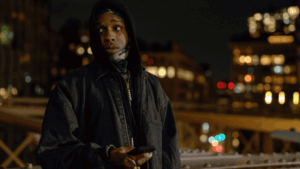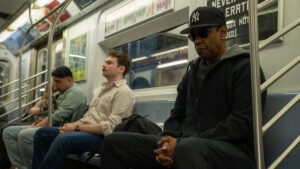Publication Date: 09-16-2025
Highest 2 Lowest (2025) review
A Spike Lee Joint
By: Steve Pulaski
Rating: ★★½
Spike Lee’s Highest 2 Lowest — a remake of the Akira Kurosawa film High and Low from 1963, itself based on a 1959 novel by Ed McBain — opens with a montage of b-roll from New York City scored to “Oh, What a Beautiful Morning” by Norm Lewis. Right away, you feel the presence of the soundtrack, which overtakes the film so much so that any background noise from these shots is nonexistent. Over the next two hours, Lee is not only going to make sure to introduce you to a plethora of characters, he’s also going to bombard you with various sounds and musical stylings, the likes of which are so integral to the protagonist’s world that it’s impossible to tell his story without them.
Following the montage, a drone shot moves us into the high-rise penthouse of David King (Denzel Washington in his fifth collaboration with Lee; their first since 2006), a multi-millionaire music mogul who struck riches thanks to the success of his label, Stackin’ Hits Records. He long ago sold off his stake in his company, but now he’s angling to buy back control — even if such an investment would put him and his family in (relative) dire financial straits for the time being.

This plan is put on pause when kidnappers, in an attempt to apprehend King’s son, Trey (Aubrey Joseph), mistakenly abduct his friend, Kyle (Elijah Wright), who is the son of King’s friend and chauffeur, Paul (Jeffrey Wright). Paul pleads with King to pay the anonymous kidnappers the $17.5 million they requested. That sum is almost the entirety of King’s net worth. His wife, Pam (Ilfenesh Hadera), believes they have an obligation to save Kyle. Like most rich people do, King confides in his lawyer, who tells him that the social media upheaval that would occur if he didn’t pay the money would be reputationally punitive, especially if he then went and use a couple mill to buy back his record company in the ensuing days. The mogul who is considered to have the “best ears in the business” also “has the coldest heart,” according to his own son.
Highest 2 Lowest isn’t exclusively about this moral dilemma, but it does make up a sizable share of the film’s 133-minute runtime. Lee’s first hour plods along at times, and when it’s believed, early on, that both Kyle and Trey have been kidnapped, the look and tone of the film adopts what I can only compare to Tyler Perry-esque melodrama. You know the type. Long, lingering shots of emotion, in this case, Pam; constant pacing and shuffling around regarding next steps; and an overall feeling of helplessness until the matter is resolved. Where so much of Lee’s filmography is predicated on urgency, these scenes feel like their purpose is to buy time.
History shows that Lee’s relationship with remakes hasn’t necessarily been a kind one. His remake of Oldboy remains one of the most questionable projects he’s ever done, and I personally couldn’t finish Da Sweet Blood of Jesus. There’s a bravery in the now-68-year-old filmmaker yet again attempting something with which he’s, at least, had mixed success. I’ve not seen Kurosawa’s High and Low — which tells the same story, only the main character is a Japanese shoe mogul — so perhaps I’m afforded more of an unbiased look at Lee’s iteration of the story than others.

What Highest 2 Lowest does differently, in a narrative sense, happens in the second act, when the kidnapping plot segues into the dawn of a second act for King himself. It’s here where Spike Lee operates more in bounds with what we’ve come to expect. During this time, a rapper named Yung Felon (A$AP Rocky) is introduced, confrontations ensue, and the soundtrack booms so loudly that you’ll find yourself rapping, “pack out the trunk from the front to the back” for at least a week.
I tried to pinpoint why I couldn’t embrace Highest 2 Lowest like I could some other contemporary Lee films like BlacKkKlansman and Red Hook Summer. I think part of it is cinematographer Matthew Libatique’s lens, which are often cold and clinical, even in closeup, with a lot of unmoving interiors that recall the blandness of Pansy’s home in Hard Truths. One element I did appreciate was the score and the soundtrack, which booms with the intensity of Lee watching his beloved Knicks in a tight game against the Celtics. It overtakes the audio-tracks and becomes a conduit of its own. When Howard Drossin’s score becomes the main attraction, repetitive synths and looping beats find the right chords to strike, be them anxiety, tension, or excitement. No matter the mood, his rhythm is always on point.
What’s missing from Highest 2 Lowest is the pointed messaging that is often so apparent with Lee’s joints. When David King monologues against social media virality and A.I. becoming the ultimate barometers for success and survival in the music business, we can believe that’s Lee lamenting the current state of Hollywood, where a film is deemed a financial disappointment if it doesn’t gross more than the GDP of most countries in the world. Lee uses Kurosawa’s story as a launchpad for these sort of observations, and while they might be sporadically entertaining, the result is not a cohesive whole.
Starring: Denzel Washington, Jeffrey Wright, Ilfenesh Hadera, A$AP Rocky, Aubrey Joseph, Elijah Wright, John Douglas Thompson, Dean Winters, LaChanze, and Isis “Ice Spice” Gaston. Directed by: Spike Lee.
About Steve Pulaski
Steve Pulaski has been reviewing movies since 2009 for a barrage of different outlets. He graduated North Central College in 2018 and currently works as an on-air radio personality. He also hosts a weekly movie podcast called "Sleepless with Steve," dedicated to film and the film industry, on his YouTube channel. In addition to writing, he's a die-hard Chicago Bears fan and has two cats, appropriately named Siskel and Ebert!


